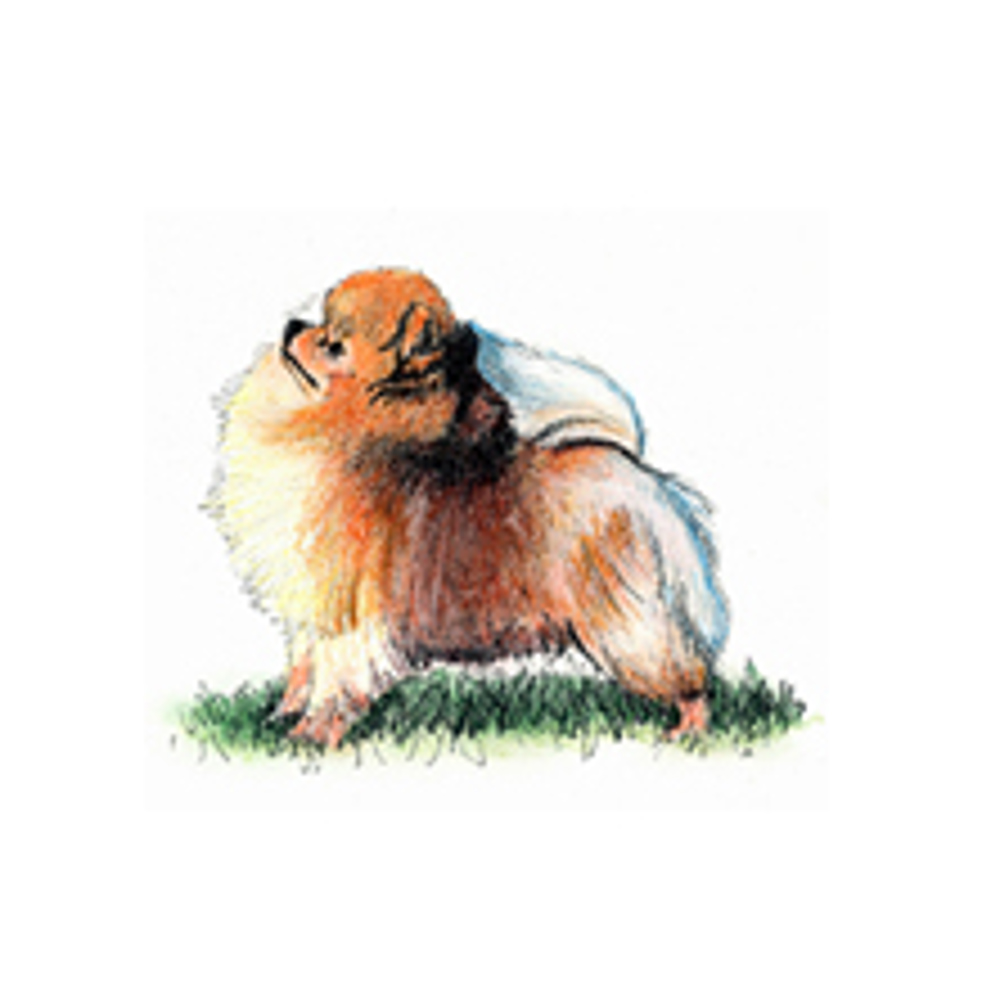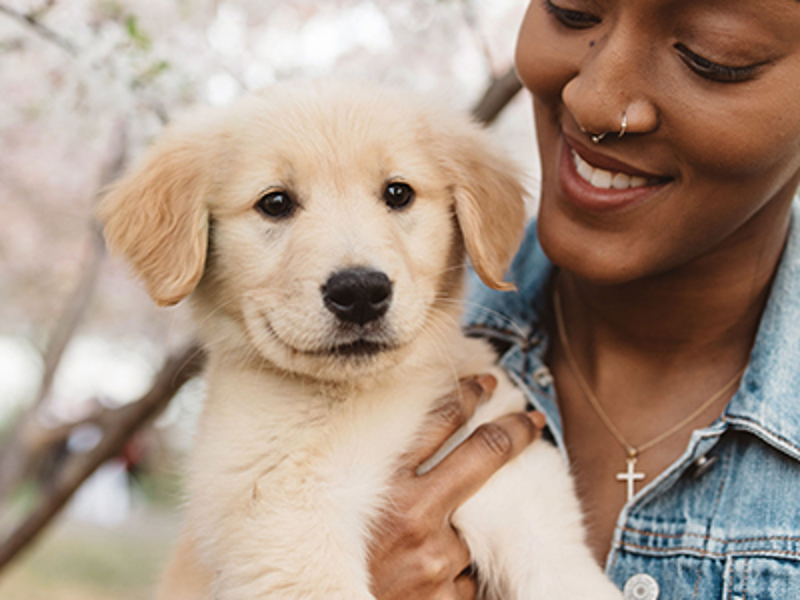
Pomeranian
Breed characteristics
- Size
- Small
- Exercise
- Up to 30 minutes per day
- Size of home
- Flat/ Apartment
- Grooming
- More than once a week
- Coat length
- Medium
- Sheds
- Yes
- Lifespan
- Over 12 years
- Vulnerable native breed
- No
- Town or country
- Either
- Size of garden
- Small/ medium garden
About this breed
The Pomeranian is the smallest of the spitz breed and was bred down from the German Spitz, which is found in the Utility Group. The breed was first seen in the UK in 1870 and became a great favourite of Queen Victoria whose dogs were exhibited at dog shows in London. Royal patronage played no small part in popularising the breed, aided by its dainty appearance and extrovert character.
Images for this breed
The Toy breed group
The Toy breeds are small companion or lap dogs. Many of the Toy breeds were bred for this capacity although some have been placed into this category simply due to their size. They should have friendly personalities and love attention. They do not need a large amount of exercise and some can be finicky eaters.
Colour Watch
Category 3: Breeds with >10% to 30% registered NBS colours or between 500 and 1000 NBS registrations per annum
Breed Standard colours
Breed standard colour means that the colour is accepted within the breed standard and is a traditional and well-known colour in this breed.
Breed standard colours in this breed include:
- Beaver
- Black
- Blue
- Chocolate
- Cream
- Orange
- White
- Orange Sable
- Wolf Sable
- Shaded Sable
- Parti Colour
Non-breed-standard colours
Non-breed-standard colour means that the colour is not accepted within the breed standard and whilst some dogs within the breed may be this colour, it is advised to only select a dog that fits within the breed standards for all points.
Colour is only one consideration when picking a breed or individual dog. Health and temperament should always be a priority over colour.
Non-breed-standard colours in this breed include:
- (NBS) Cream Sable
- (NBS) Black and Tan
- (NBS) Blue and Tan
- (NBS) Black and Silver
- (NBS) Black with white markings
- (NBS) Blue with white markings
- (NBS) Chocolate with white markings
- (NBS) Cream with white markings
- (NBS) Orange with white markings
- (NBS) Orange Sable with white markings
- (NBS) Wolf Sable with white markings
- (NBS) Shaded Sable with white markings
Education notes
|
Orange (including red orange, light orange, bright orange) |
|
Orange Sable (including red orange sable, light orange sable, bright orange sable) |
|
Parti Colour (Any whole colour or sable evenly marked patches on White eg Black & White Parti, Red Orange & White Parti, Blue & White Parti Orange Sable and White Parti etc.) |
Other colour/s
'Other' means you consider your puppy to be a colour not currently known within the breed and one that does not appear on either the breed standard or non-breed-standard list. In this instance you would be directed through our registration process to contact a breed club and/or council to support you on identifying and correctly listing the new colour.
Health
Whether you're considering buying a Pomeranian puppy or breeding from your dog, it's important to understand the health issues that may affect the breed and how they can be managed or avoided.
Pre-breeding Health Screening
Best Practice schemes and tests
These tests address conditions that are still significant for the breed, though they might be less common or newly identified, and research is ongoing to determine their full impact
To support the breed’s health, responsible breeders should ensure they complete all tests in best practice.
- CM/SM screening using the KC/ BVA Chiari-like malformation/ syringomyelia (CM/SM) screening scheme
- Eye testing using the BVA/KC/ISDS Eye Scheme
This breed can be affected by conformational concerns, more information can be found here
Find out about a particular dog's results
Please visit our Health Test Results Finder to discover the DNA or screening scheme test results for any dog on The Kennel Club's Breed or Activity Register.
You can also view the inbreeding coefficient calculation for a puppy's parents, or for a dog you're thinking of breeding from.
DNA Testing Services
We don’t currently offer a breed-specific DNA testing package for this breed, but we have a wide selection of individual DNA tests available. To find out more and view our full selection, click here
Breed Health & Conservation Plan
The Breed Health and Conservation Plans
Our breed health and conservations plans (BHCPs) use evidence and data to help us understand the health issues found in each pedigree dog breed. These plans help breeders and owners identify health and welfare problems and use information, health tests and health schemes to avoid passing on those problems to future puppies. They also support and provide breeders with tools and specialist expertise to help manage genetic diversity, understand the impacts of close breeding, and find the best ways to preserve the population of their breed.
Working together for the breed
We’ve worked with breed clubs and breed representatives to gather all available evidence to help us determine the priority concerns for the breed and decide how we can work together to manage and reduce these problems.
The full evidence base is available at the discretion of the breed clubs, however if you would like to seek access to the full report, please contact our health team.
More about health
Have any questions about health in your breed?
If you have any concerns about a particular health condition in your breed then you may wish to speak to your vet or you could contact your breed health co-ordinator.
Breed health co-ordinators are individuals working on behalf of breed clubs and councils who are advocates for the health and welfare of their chosen breed. They acts as a spokesperson on matters of health and will collaborate with The Kennel Club on any health concerns the breed may have.
To contact your breed health co-ordinator please email
Health (The Kennel Club)
Breed watch
Category 2
Particular points of concern for individual breeds may include features not specifically highlighted in the breed standard including current issues. In some breeds, features may be listed which, if exaggerated, might potentially affect the breed in the future.
Breeding restrictions
There are a number of The Kennel Club's rules and regulations that may prevent a litter from being registered, find out about our general and breed specific breeding restrictions below.
More about breeding
There are not currently any additional breed specific restrictions in place for this breed.
Looking for a puppy?
Looking for a Pomeranian? Explore our list of puppies and rescue dogs for sale near you.
More information

Need to find out more about a breed?
Use our Find a Club service where you can locate breed clubs that can offer support and advice.

Use our Find a Puppy service
The Kennel Club's Find a Puppy service provides contact details for breeders who have puppies available. Let's help you find your new best friend.

Get the best lifetime pet insurance
At Kennel Club Pet Insurance, we want you to focus on getting the best possible treatment for your dog without worrying about the cost.
